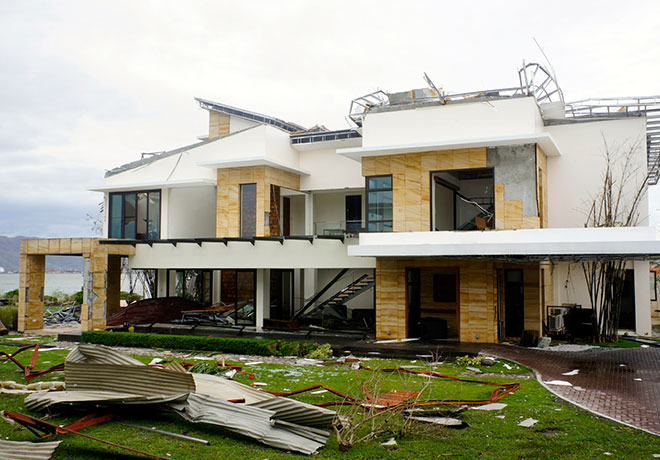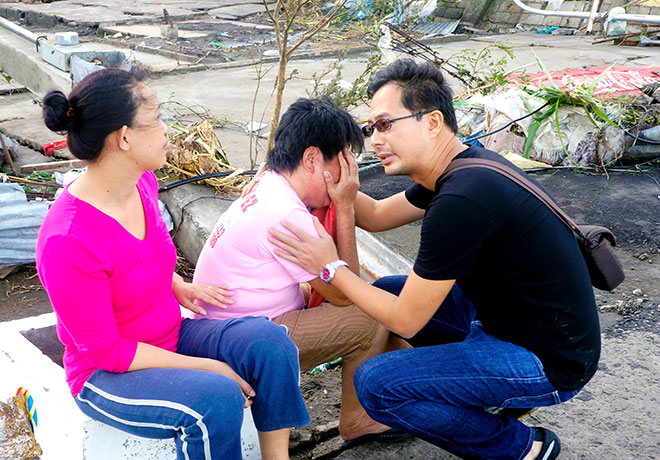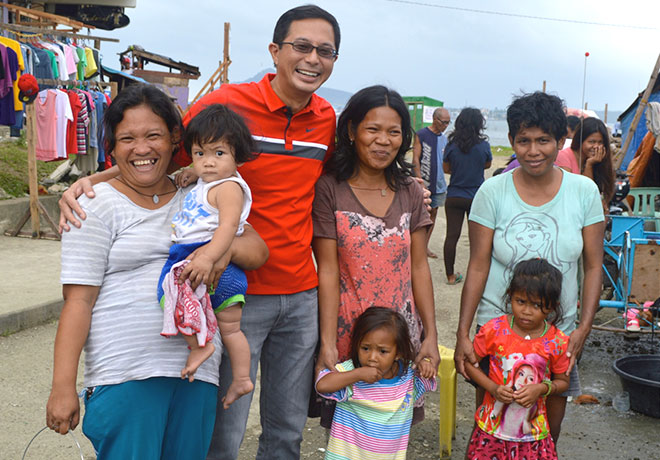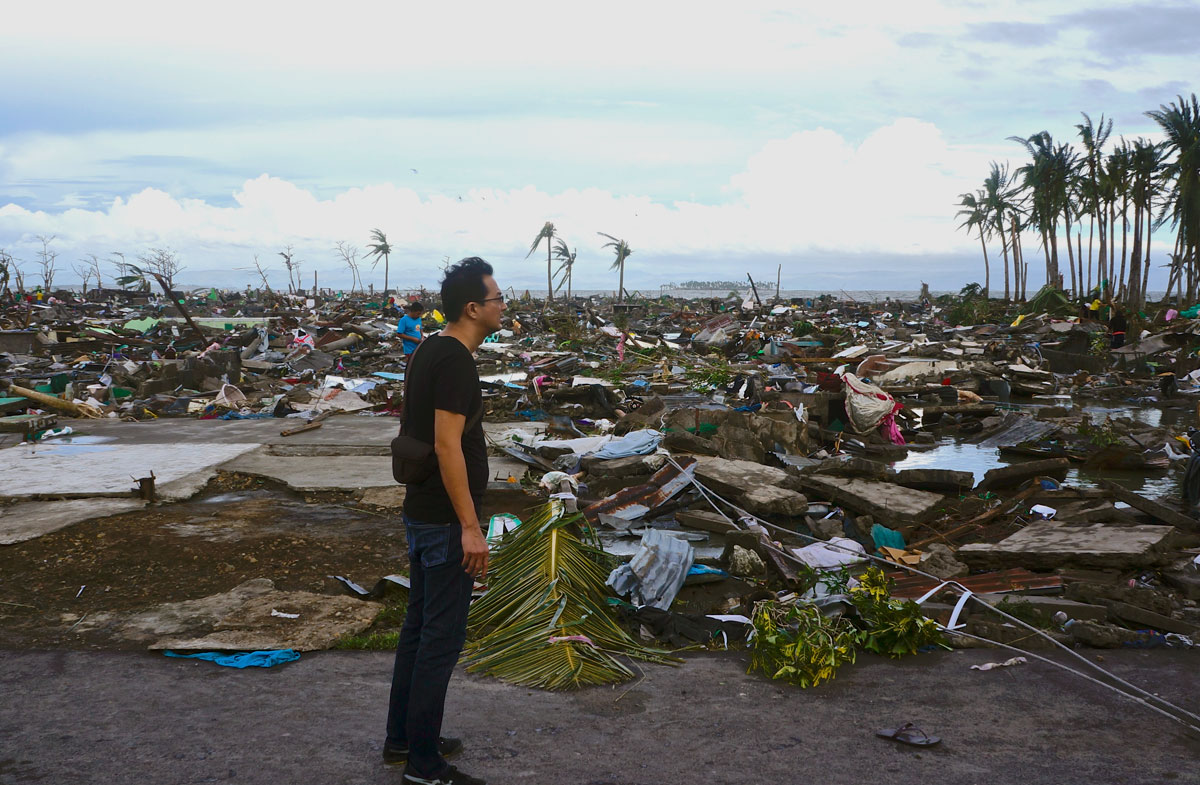On the morning of 8 November 2013, the newly-elected vice mayor of Tacloban City sat down for breakfast with his wife and kids. Joining them was a journalist friend and his news team, who hoped to shoot a good angle of the expected typhoon from the Yaokasin family’s home facing the bay.
The day before had been so sunny that people had laughed at the warning of an approaching storm, in true Noah-times fashion. No one would have believed that one of the worst typhoons in history was barreling toward the central Philippines.
Just as they were about to eat, the roof over the living room was suddenly wrenched off by winds reaching 310 km/hr (195 mph), one of the strongest recorded on earth. The Yaokasins and the news team ran to the ground floor, only to find that water was quickly rising inside the rooms. The typhoon had generated a massive storm surge—a wave of ocean water up to 30 feet deep that submerged the city within minutes.

Jerry, his family, and the news team barely made it out through the windows to the safety of higher ground. But many were not as fortunate. When the storm cleared, it left 3,000 people dead and 90 percent of the city’s buildings demolished. In total, Typhoon Haiyan affected a staggering 11 million people in the central Philippines. But nearly half of the total deaths were in Tacloban.
‘It was as if an atomic bomb was dropped in the heart of our city,’ says Jerry. ‘The most heartbreaking was the sight of dead bodies everywhere. Young and old. Babies. Small children. Adults and senior citizens. All waiting to be identified and buried. I remember the comment made by first responders: “You will know you are in Tacloban when you can start smelling the stench of death.”’

In the apocalyptic hours following the typhoon, widespread looting of food and wares began, setting the government back tremendously in their efforts to reestablish order. Inmates in the prison rioted, and some managed to escape. At night there was complete darkness. Survivors had no access to food or water; desperation and grief were everywhere.
It was the words of Esther 4:14 that kept Jerry going during those difficult days. He clung to the words that ‘God in his sovereignty and providence has put me in this position and in this place for such a time as this.’
Jerry and what was left of the local government worked as quickly as they could to get food, water, and shelter for the survivors, to recover and bury the dead, and to restore the city’s basic infrastructure of roads, electricity, water, and telecommunication services, all of which had been destroyed.
But for Jerry, the most important thing was being a presence of hope to the victims. ‘It is very important during a crisis to let your people know that you are there with them. While many fled, I stayed. While many cried, complained, and criticized, I comforted. I tried to instill hope in them, as many had lost hope at that time of ever recovering from the tragedy.’
Word spread among the churches in the Philippines that the vice mayor of Tacloban was a Christian. In a country with divided trust toward the government, many individuals, churches, and organizations were hesitant to send their support until they heard about Jerry’s faith. The donations and assistance they sent directly to his office allowed him to extend much-needed help to the victims.

Today, five years later, the city of Tacloban has mostly recovered since the devastation of Typhoon Haiyan, though its people are still hurting. As he completes his final term as vice mayor, Jerry continues to hold fast to a particular style of servant leadership that sets him apart. ‘Even though the city is mostly rebuilt, I know that my job is more than just rebuilding the city,’ says Jerry. ‘It is to rebuild the lives of our people.’
Perhaps this is the key that has won him an unprecedented three terms in office, completely unopposed in his last term. Unlike most other politicians who keep their distance from the public, Jerry draws from his past experience as a pastor to meet regularly and personally with his people, comforting them, helping them, and even praying with them. He sees it, in fact, as his ministry.
It’s a calling that goes back to the year 2000, when he left pastoral ministry to pursue politics after meeting other Christians in government positions. The paradigm shift that occurred that year led him to realize that Christians can and must be engaged in all spheres of life—including, and perhaps especially, in an area like politics that is often seen as ‘dirty’.

‘To be a public servant is a legitimate calling of God,’ he says. ‘Never underestimate what God can do in and through your life . . . he has called us to be the Josephs, Esthers, and Daniels for such a time as this!’
Jerry is not alone in his desire to bring the gospel to the workplace and its workers. In June 2019, he will be joining over 700 carefully selected participants from around the world for the Lausanne Global Workplace Forum (GWF). This global gathering, which will serendipitously be in the Philippines, is designed to serve as a major push to overcome the archaic secular-sacred divide and empower Christians in all workplaces to live out their gospel callings.
Jerry hopes to collaborate with other leaders at GWF on new ideas and initiatives that can help engage the whole church in their calling, in whatever workplace they are in. Joining him will be other government leaders, as well as teachers, craftsmen, doctors, homemakers, businessmen, journalists, researchers, artists—God’s people in all their beautiful array of unique and necessary callings. Together, Jerry and the other GWF participants hope ‘that our Sunday faith will be demonstrated in the Monday marketplace; that we will realize that our calling to the workplace is as important as the calling to missions and to full-time ministry.’
Pray with Us
by Jerry Yaokasin
Father, we thank you for the gift of talents and skills and the opportunity to glorify you through our work. Help us to fully embrace our divine calling as your disciples in the workplace. May our work be our ministry and the workplace our mission field. Help us to stand firm in our faith, excel in our work, and bear much fruit for your kingdom.
Sources:
https://www.bbc.com/news/world-asia-24891456
https://www.nytimes.com/2018/09/14/world/asia/typhoon-mangkhut-philippines-haiyan.html

